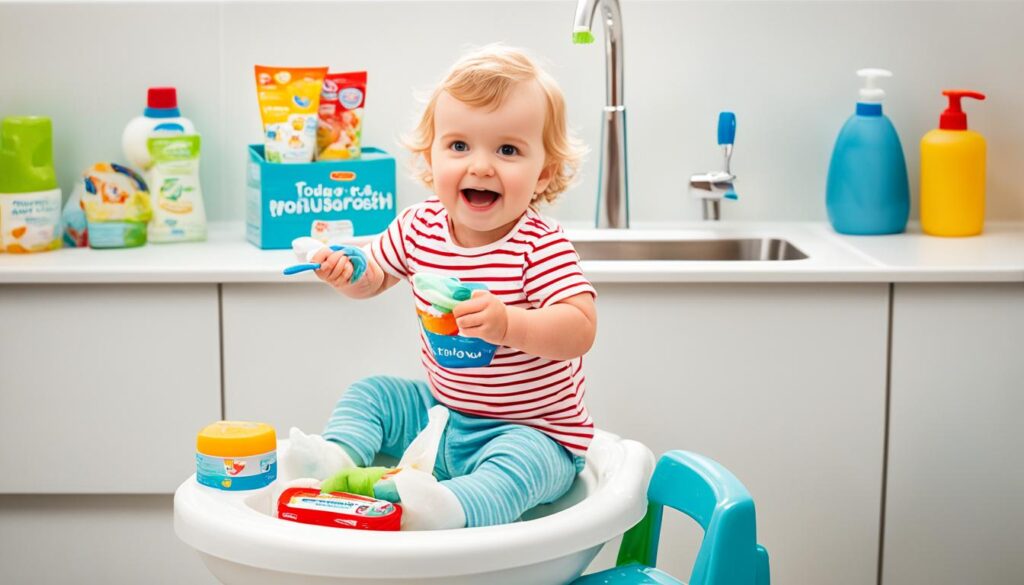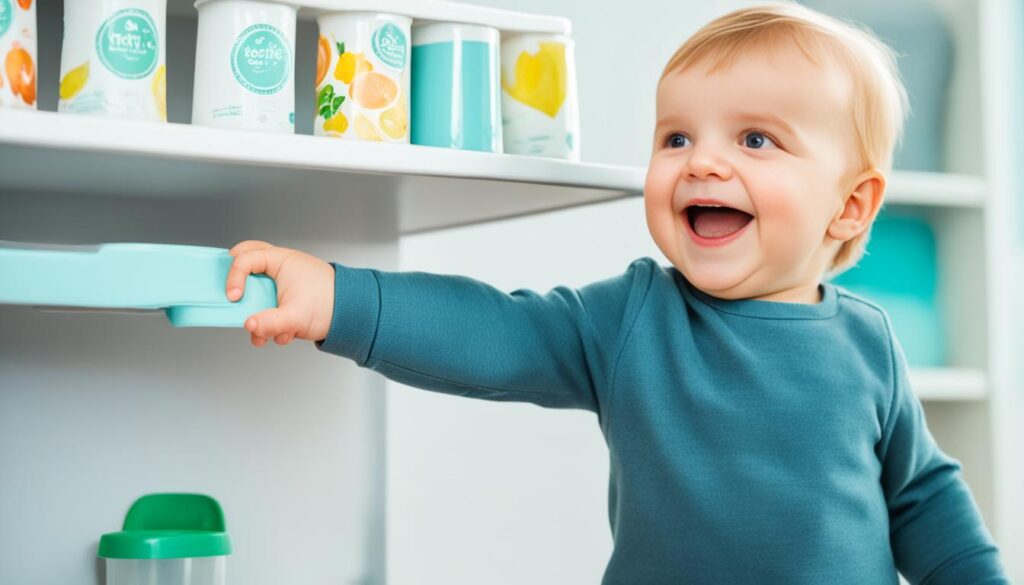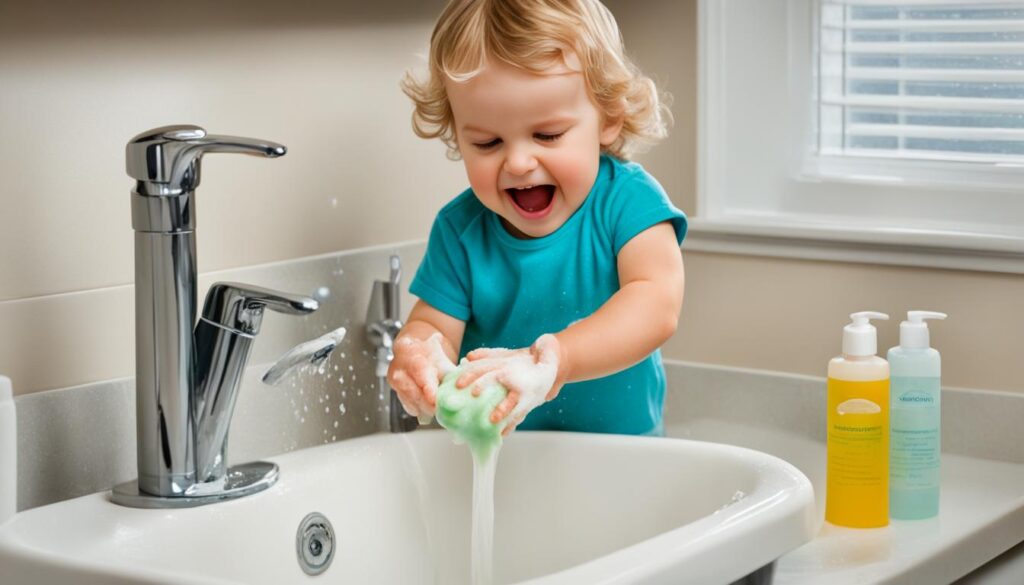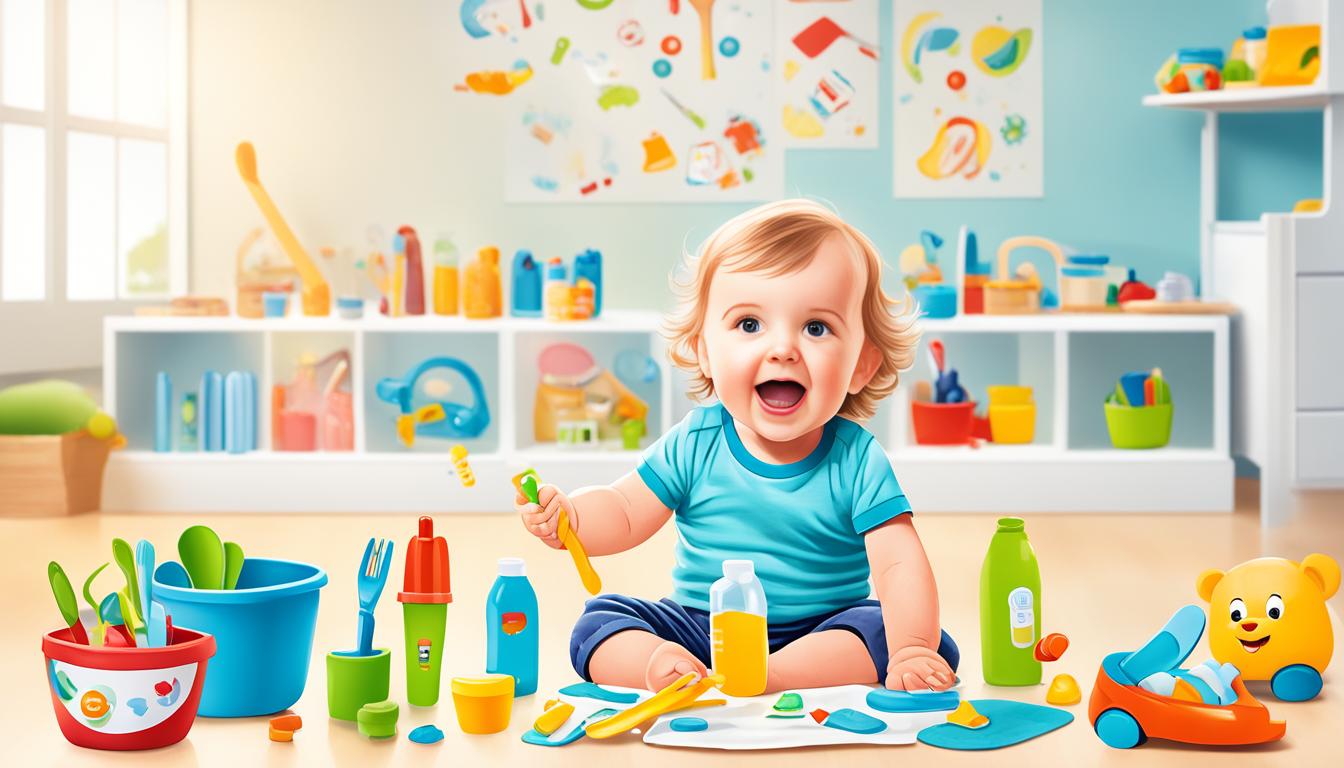Toddlers begin developing self-help skills at an early age as they work to master basic self-care tasks and foster independence. These skills are essential for their daily living activities and overall development. By learning and practicing these skills, toddlers gain a sense of autonomy and self-reliance.
Key Takeaways:
- Toddlers develop self-help skills to master basic self-care tasks.
- Self-help skills are crucial for toddlers’ daily living activities and overall development.
- Developing self-help skills fosters toddlers’ independence and sense of autonomy.
- Toddlers can start by mastering basic tasks like handwashing, brushing teeth, and dressing themselves.
- Teaching self-help skills through fun and engaging activities helps toddlers build confidence in taking care of themselves.
The Importance of Self-Help Skills in Toddlers
Self-help skills play a crucial role in the development of toddlers. It helps them achieve important milestones and fosters their independence. By learning and practicing basic self-care tasks, toddlers gain a sense of autonomy and self-reliance.
Toddlers go through various developmental stages, and acquiring self-help skills is an essential part of their growth. These skills enable them to perform everyday tasks independently, making them feel competent and capable.
One of the key benefits of self-help skills is that they contribute to the overall development of a toddler. By mastering these skills, toddlers achieve important milestones and meet age-appropriate expectations. This includes milestones related to motor skills, cognitive abilities, and social-emotional development.
Fostering independence in toddlers not only enhances their development but also promotes a positive self-image and self-esteem. By allowing toddlers to take ownership of their actions and accomplish tasks on their own, they develop a sense of pride and self-confidence.
“Independence is not the absence of help but the presence of self-empowerment.”
Teaching toddlers self-help skills also paves the way for smoother transitions as they grow older. When toddlers acquire the ability to dress themselves, feed independently, and perform other self-care tasks, it lightens the load for parents and caregivers, and eases the transition to preschool or daycare.
Furthermore, self-help skills teach toddlers valuable life skills that they will carry with them throughout their lives. By instilling a sense of responsibility and self-reliance from an early age, parents and caregivers set a solid foundation for their future success.
Taking a proactive role in promoting self-help skills in toddlers is vital. Parents and caregivers can create an environment that encourages exploration, problem-solving, and independence. By providing age-appropriate opportunities for practice and continuous support, toddlers can thrive in their self-help development.
Next, we will explore some basic self-care skills that toddlers can learn and practice to foster their independence and overall development.
Key Milestones in Toddler Self-Help Development
| Age Range | Self-Help Milestones |
|---|---|
| 12-18 months | Drinking from a cup, eating with a spoon/fork, assisting with dressing |
| 18-24 months | Using a potty, washing hands with assistance, cleaning up toys |
| 24-36 months | Pulling up pants, washing hands independently, brushing teeth with assistance |
| 36-48 months | Dressing independently, brushing teeth independently, using utensils proficiently |
Basic Self-Care Skills for Toddlers
Toddlers begin their journey to independence by mastering basic self-care skills. By teaching these skills through fun and engaging activities, parents and caregivers can help toddlers develop confidence and independence in taking care of themselves.
Here are some essential self-care skills for toddlers:
- Handwashing: Teach toddlers the importance of washing their hands before and after meals, after using the toilet, and after playing outside. Encourage them to use soap and scrub their hands for at least 20 seconds.
- Brushing Teeth: Show toddlers how to brush their teeth using a soft-bristled toothbrush and kid-friendly toothpaste. Teach them to brush all sides of their teeth and to spit out the toothpaste.
- Dressing Themselves: Help toddlers practice dressing themselves by choosing clothes that are easy to put on and take off. Start with simple tasks like putting on socks or pulling up pants.
- Eating Independently: Encourage toddlers to feed themselves using utensils. Provide them with age-appropriate utensils and plates to make it easier for them to scoop and eat their food.
- Toileting: Introduce toddlers to the concept of using the toilet by providing a child-sized potty seat or a step stool and training seat for the regular toilet. Teach them the proper technique for wiping and handwashing after using the toilet.
Teaching these self-care skills to toddlers can be fun and interactive. Use songs, rhymes, and games to make the learning process enjoyable and engaging. Celebrate their achievements and provide positive reinforcement to boost their confidence.
By empowering toddlers to take care of themselves, parents and caregivers lay the foundation for their future independence and self-reliance.

Developing Self-Reliance in Toddlers
Promoting toddler independence is crucial for their self-reliance. Encouraging them to make choices, solve simple problems, and complete tasks on their own builds their confidence and sense of capability.
As toddlers grow and develop, it is important to provide them with opportunities to exercise their independence. By allowing them to take on age-appropriate responsibilities, we empower them to become self-reliant individuals who can navigate the world with confidence.
Encouraging Decision-Making
One way to promote toddler independence is by encouraging them to make decisions. Start with small choices, such as selecting their clothes for the day or choosing a snack from a given set of options. By giving them the freedom to make decisions, we foster their problem-solving skills and help them develop a sense of autonomy.
“Allowing toddlers to make decisions gives them a sense of control and helps them develop critical thinking skills.”
Supporting Problem-Solving
Toddlers learn problem-solving skills by facing challenges and finding solutions on their own. Provide them with age-appropriate puzzles, games, or simple tasks to solve independently. This helps them develop critical thinking skills and boosts their confidence in overcoming obstacles.
Encouraging Task Completion
Completing tasks independently is essential for toddler self-reliance. Start with simple activities like putting away toys, setting the table, or cleaning up after meals. Break tasks down into manageable steps and provide clear instructions. As toddlers successfully complete these tasks, praise their efforts and reinforce their ability to accomplish tasks on their own.
Promoting Confidence
Building a toddler’s self-reliance involves promoting self-confidence. Acknowledge their accomplishments, even if they are small, and provide positive reinforcement for their efforts. This boosts their self-esteem and encourages them to continue exploring their capabilities.
Encouraging toddler independence is a gradual process that requires patience and support. By promoting decision-making, supporting problem-solving, and fostering task completion, we can help toddlers develop the essential skills needed for self-reliance.
| Benefits of Promoting Toddler Independence | Ways to Promote Toddler Independence |
|---|---|
| 1. Boosts self-confidence | 1. Encourage decision-making |
| 2. Enhances problem-solving skills | 2. Support problem-solving |
| 3. Fosters sense of autonomy | 3. Encourage task completion |
| 4. Develops critical thinking | 4. Promote confidence |
Fostering Toddler Independence in Daily Activities
Encouraging toddler independence in their daily activities can help promote their overall development and self-help skills. By teaching them age-appropriate tasks and gradually increasing their responsibilities, parents and caregivers can support their journey towards independence.
Teaching Age-Appropriate Skills
One effective way to promote toddler independence is by teaching them age-appropriate skills that they can practice and master. These skills can include tasks such as:
- Eating: Encourage toddlers to feed themselves using child-sized utensils and allow them to explore different food textures.
- Drinking: Teach toddlers to drink from a cup instead of relying on a bottle or sippy cup, promoting their motor skills and self-reliance.
- Cleaning up: Involve toddlers in tidying up their toys and belongings, teaching them responsibility and the importance of keeping their surroundings organized.
By incorporating these activities into their daily routine, toddlers can develop a sense of autonomy and achievement, boosting their confidence and independence.
Gradually Increasing Responsibility
As toddlers become more proficient in self-help skills, parents can gradually increase their responsibilities. This allows toddlers to develop a greater sense of independence and self-reliance over time.
“Encourage your toddler to take on more tasks independently, such as dressing themselves, putting on their shoes, or setting the table. Offer support and guidance when necessary, but allow them to complete the tasks on their own. This helps them build confidence and a sense of accomplishment.”
By offering opportunities for toddlers to take on small, manageable tasks, they will feel a sense of ownership and pride in their abilities. This, in turn, motivates them to tackle more challenging tasks and develop a stronger sense of independence.

Benefits of Promoting Independence
Promoting toddler independence in daily activities has numerous benefits for their overall development. Some advantages include:
- Enhanced self-esteem: Independence allows toddlers to experience a sense of accomplishment and self-worth, boosting their self-esteem.
- Improved problem-solving skills: Encouraging toddlers to navigate daily tasks independently helps them develop problem-solving abilities and self-reliance.
- Stronger self-help skills: By fostering independence, toddlers develop essential self-help skills that are crucial for their daily living activities.
By supporting and nurturing toddler independence, parents and caregivers lay the foundation for their child’s future success and well-being. Start early and provide guided opportunities for toddlers to explore and develop their independence, allowing them to thrive as they grow.
Teaching Toddlers Self-Sufficiency
Teaching toddlers self-sufficiency is a crucial aspect of promoting their independence and fostering their self-help skills. By providing them with opportunities to practice and master essential tasks on their own, we can empower them to become more self-reliant.
Engaging toddlers in age-appropriate activities that encourage self-sufficiency helps build their confidence and sense of capability. Here are some toddler self-sufficiency activities that you can incorporate into their daily routine:
- Tidying up toys: Encourage your toddler to clean up their toys after playtime. This teaches them responsibility and the importance of keeping their space organized.
- Putting on shoes: Guide your toddler in learning how to put on their shoes independently. Start with Velcro or slip-on shoes and gradually introduce laces as they develop their fine motor skills.
- Feeding themselves: Allow your toddler to feed themselves during mealtime. Provide them with easy-to-handle utensils and foods that they can easily pick up and eat on their own.
These self-sufficiency activities not only promote independence but also enhance their fine motor skills, cognitive development, and decision-making abilities.
Empowering toddlers to complete tasks independently nurtures their self-help skills and sets the foundation for a lifetime of independence.
| Toddler Self-Sufficiency Activities | Description |
|---|---|
| Tidying up toys | Encourage toddlers to clean up their toys after playtime, promoting responsibility and organization. |
| Putting on shoes | Guide toddlers in learning how to put on their shoes independently, starting with Velcro or slip-on shoes and gradually introducing laces. |
| Feeding themselves | Allow toddlers to feed themselves during mealtime with easy-to-handle utensils and foods, fostering their self-feeding capabilities. |
By incorporating these self-sufficiency activities into your toddler’s daily routine, you are promoting their independence and self-help skills, while also fostering their overall development.
Encouraging Autonomy in Toddlers
Encouraging autonomy in toddlers is a crucial aspect of their development. By promoting autonomy, we empower young children to take ownership of their choices, engage in age-appropriate activities, and gradually develop self-help skills. This process not only nurtures their independence but also fosters their overall growth and well-being.
Toddlerhood is a time of rapid development and exploration. It is during this stage that children start asserting their individuality and seeking more control over their lives. Encouraging autonomy allows them to navigate their world with confidence and self-assurance.
“Allowing children to develop a sense of autonomy from an early age helps them build resilience, confidence, and a positive self-identity.”
One way to promote autonomy in toddlers is by giving them choices. By offering age-appropriate options, such as letting them choose their outfit or select a snack from a healthy range, we allow them to assert their preferences and make decisions that align with their developing personality. This fosters a sense of independence and self-reliance.
Engaging toddlers in age-appropriate activities also encourages autonomy. Setting up simple tasks, such as putting toys away or arranging their books, allows them to take responsibility for their belongings and contributes to their self-help skills. These activities instill a sense of accomplishment and self-sufficiency.
Benefits of Encouraging Autonomy
Encouraging autonomy in toddlers has numerous benefits. It helps develop their problem-solving abilities, decision-making skills, and self-confidence. By allowing them to take the lead in age-appropriate tasks and activities, we foster their sense of competence and independence.
Additionally, promoting autonomy supports the development of self-help skills in young children. When toddlers are given opportunities to dress themselves, eat independently, and clean up after themselves, they gain valuable life skills and a sense of mastery over their own actions.
By encouraging autonomy in toddlers, we lay the foundation for their future success and well-being. It empowers them to become capable, self-reliant individuals who are equipped with essential skills for navigating life’s challenges.

| Ways to Encourage Autonomy | Benefits of Autonomy |
|---|---|
| Allowing choices within boundaries | Develops decision-making skills |
| Engaging in age-appropriate tasks | Builds self-help skills |
| Encouraging problem-solving | Fosters critical thinking abilities |
| Supporting independence | Builds self-confidence and resilience |
Teaching Life Skills to Toddlers
When it comes to toddlers, teaching life skills goes beyond basic self-care tasks. By introducing activities like tidying up, setting the table, and organizing their belongings, parents and caregivers can help toddlers develop essential life skills that contribute to their overall growth and prepare them for more complex tasks in the future.
“Teaching life skills to toddlers not only empowers them to become more self-sufficient but also nurtures their cognitive, physical, and social development.”
Toddlers are at an age where they are curious, eager to learn, and capable of absorbing information through hands-on experiences. By incorporating practical activities into their daily routine, parents can create an engaging and supportive learning environment. Let’s explore some key life skills that can be taught to toddlers:
Tidying up
Encouraging toddlers to participate in cleanup tasks helps them develop a sense of responsibility and organization. Simple activities like putting away toys or sorting objects into designated bins teach toddlers about cleanliness, order, and the importance of taking care of their surroundings.
Setting the table
Teaching toddlers how to set the table for meals not only fosters their independence but also promotes fine motor skills and spatial awareness. By involving them in this activity, parents can engage their toddlers in counting, matching, and categorizing objects.
Organizing belongings
As toddlers acquire more belongings, teaching them how to organize and take care of their personal items becomes important. This skill helps them develop a sense of ownership, responsibility, and the ability to keep track of their belongings.
By teaching life skills to toddlers, parents and caregivers instill a sense of confidence, capability, and self-reliance in children from a young age. These skills prepare them for independent living and lay a strong foundation for their future success.
| Benefits of Teaching Life Skills to Toddlers |
|---|
| 1. Encourages independence and self-sufficiency |
| 2. Fosters responsibility and accountability |
| 3. Enhances problem-solving and decision-making abilities |
| 4. Develops fine motor skills and hand-eye coordination |
| 5. Boosts cognitive and social development |
Toddlers may not grasp these skills immediately, so patience, consistency, and positive reinforcement are key. Celebrate their efforts, emphasize the value of their contributions, and provide age-appropriate tasks that gradually increase in complexity.
Promoting Independence in Toddlers
Promoting independence in toddlers is an essential aspect of their growth and development. By creating a supportive environment that encourages exploration, problem-solving, and self-help, parents and caregivers can empower their little ones to become independent individuals.
One effective way to promote independence in toddlers is by allowing them to make age-appropriate choices. Whether it’s deciding on what clothes to wear or which activity to engage in, giving toddlers the opportunity to make decisions helps foster their sense of autonomy. This not only boosts their confidence but also enhances their problem-solving skills as they learn to assess options and make informed choices.
Another important approach to teaching toddlers independence is by providing them with opportunities to practice their skills. Whether it’s putting on their own shoes, feeding themselves, or tidying up their toys, engaging toddlers in self-help tasks allows them to develop important life skills and gain a sense of accomplishment. By offering guidance and support while giving them space to complete tasks on their own, parents and caregivers can nurture their independence.
Moreover, it’s crucial to encourage toddlers to explore their surroundings and learn through hands-on experiences. Allowing them to engage in activities that challenge their problem-solving abilities, such as building blocks or solving puzzles, helps develop their cognitive skills and instills a sense of pride in their accomplishments.
By promoting independence in toddlers, parents and caregivers lay the foundation for their future success and well-being. These early experiences of autonomy and self-help contribute to their overall development and help them become confident and capable individuals.
“When we empower toddlers to become independent and self-reliant, we equip them with essential life skills and instill a strong sense of self-confidence.”
Toddler Independence Activity Ideas
Here are some engaging activities that can help toddlers develop their independence:
- Encourage them to dress themselves, starting with simple tasks like putting on socks or buttoning up their shirts.
- Set up a designated play area where toddlers can choose and engage in activities independently.
- Involve them in meal preparation, such as letting them mix ingredients or set the table.
- Provide age-appropriate tools and materials for art and craft projects, allowing toddlers to create and explore their creativity.
- Establish a routine for tidying up toys and encourage children to take responsibility for keeping their play area organized.
Remember, promoting independence in toddlers is a gradual process that requires patience and support. Celebrate their achievements, no matter how small, and continue to provide guidance and encouragement along the way.
| Benefits of Promoting Independence in Toddlers | Activities to Promote Independence in Toddlers |
|---|---|
| 1. Boosts self-confidence | 1. Allowing toddlers to choose their outfits |
| 2. Develops problem-solving skills | 2. Involving toddlers in meal preparation |
| 3. Enhances cognitive development | 3. Providing age-appropriate art and craft materials |
| 4. Fosters a sense of responsibility | 4. Establishing a routine for tidying up toys |

Promoting Self-Help Development in Toddlers
Promoting self-help development in toddlers is a crucial aspect of their overall growth and independence. By understanding their developmental milestones and offering appropriate guidance and support, parents and caregivers play a pivotal role in fostering the acquisition of self-help skills.
Toddlers go through various developmental milestones as they learn to take care of themselves. These milestones mark their progress and provide valuable insight into their capabilities. Recognizing and acknowledging these milestones helps parents and caregivers identify the most appropriate skills to focus on and support their child’s development.
“Self-help skills are the building blocks of independence, enabling toddlers to become more confident and self-reliant.”
Encouragement plays a vital role in promoting self-help skills. When toddlers make efforts to independently complete tasks and take care of themselves, it is important to recognize their efforts and provide positive reinforcement. This fosters a sense of accomplishment and motivates them to continue developing their self-help skills.
Engaging toddlers in age-appropriate activities is another effective way to promote self-help development. These activities could include simple tasks like putting away toys, feeding themselves, or dressing independently. By actively involving toddlers in these activities, they gain a sense of responsibility and develop confidence in their abilities.
Parents and caregivers can also introduce visual aids, such as charts or step-by-step guides, to help toddlers understand and follow the sequence of self-help tasks. This visual support assists in building their cognitive and motor skills, while also reinforcing the importance of self-help skills.
Remember that each child develops at their own pace, so it is important to be patient and provide appropriate support. Celebrate their achievements, no matter how small, and offer guidance and encouragement when they encounter challenges.
By promoting self-help development in toddlers, parents and caregivers are setting the stage for their future independence and success. These skills not only contribute to their daily routines but also lay the foundation for lifelong learning and self-reliance.
Developmental Milestones in Toddlers
As toddlers navigate their way through self-help development, they reach important milestones that signify their progress. Here are some key developmental milestones to watch out for:
- Gaining the ability to eat and drink independently
- Starting to dress and undress with minimal assistance
- Learning to wash hands and perform basic hygiene tasks
- Developing the ability to use utensils effectively
- Showing interest in toilet training
It’s important to remember that these milestones are generalized and may vary for each child. However, they provide a rough guide for assessing a toddler’s self-help development.
Encouraging Independent Task Completion in Toddlers
Encouraging independent task completion in toddlers is a crucial step in their self-help skill development. By breaking down tasks into manageable steps and providing clear instructions, parents and caregivers can empower toddlers to do tasks independently, fostering their confidence and autonomy.
Breaking Down Tasks
When introducing a new task to a toddler, it’s important to break it down into smaller, achievable steps. This helps them understand the process and prevents them from feeling overwhelmed. For example, if the task is getting dressed, you can break it down into steps like choosing clothes, putting on one item at a time, and fastening buttons or zippers.
Providing Clear Instructions
Clear and concise instructions are essential for toddlers to understand what is expected of them. Use simple language and demonstrate the task if necessary. Be patient and give them time to process the information. For example, if the task is brushing their teeth, you can say, “Take your toothbrush, put toothpaste on it, and brush your teeth up and down for two minutes.”
Allowing Independent Completion
Once you have broken down the task and provided clear instructions, it’s essential to step back and allow toddlers to complete the task on their own. This gives them the opportunity to practice and develop their self-help skills without constant assistance. Offer guidance and support as needed, but refrain from taking over the task completely.
By encouraging independent task completion, parents and caregivers empower toddlers to take ownership of their actions and develop important self-help skills. This promotes their overall independence and prepares them for future tasks and responsibilities.

Developing Self-Care Skills in Toddlers
Developing self-care skills in toddlers is an important aspect of their overall growth and independence. By gradually introducing age-appropriate tasks and providing consistent practice, parents and caregivers can help toddlers acquire and refine vital self-care skills. Let’s take a closer look at some key self-care skills for preschoolers and toddlers.
1. Hand Hygiene
Teaching toddlers proper handwashing techniques is crucial for their health and hygiene. Encourage them to use soap and water to wash their hands before meals, after using the toilet, and after playing outside. Guide them on how to effectively scrub their hands, including the backs and between the fingers, for at least 20 seconds.
2. Grooming
Show toddlers how to brush their teeth using a small, soft-bristled toothbrush and a pea-sized amount of fluoride toothpaste. Supervise their brushing to ensure they reach all areas of their mouth. Additionally, introduce them to grooming tasks like combing their hair, washing their face, and trimming their nails with child-safe nail clippers.
3. Toileting
Introducing toddlers to toilet training is an essential step towards independence. Teach them how to recognize the sensation of needing to use the toilet and guide them through the process of using it independently. Provide them with a child-sized potty chair or a step stool to use the regular toilet, and make sure to offer praise and encouragement for their efforts.

By nurturing these self-care skills, parents and caregivers empower toddlers with the ability to take care of themselves, promoting their independence and boosting their self-confidence. Consistency, patience, and positive reinforcement go a long way in helping toddlers develop these essential self-care skills that will benefit them throughout their lives.
Conclusion
In conclusion, fostering toddler self-help development is crucial for their overall growth and independence. By actively engaging in teaching and supporting their self-help skills, parents and caregivers lay a solid foundation for their future success. Through guidance and practice, toddlers can acquire a wide range of self-help skills, enhancing their independence and self-reliance.
Encouraging autonomy and providing opportunities for toddlers to make choices and complete age-appropriate tasks independently helps build their confidence and sense of capability. Teaching life skills beyond basic self-care tasks prepares them for more complex responsibilities in the future.
By nurturing toddler self-help development, parents and caregivers empower their little ones to take care of themselves and build the skills they need to thrive. With consistent support, toddlers can become more self-sufficient, confident individuals who are capable of tackling various challenges that come their way.
